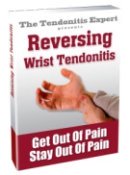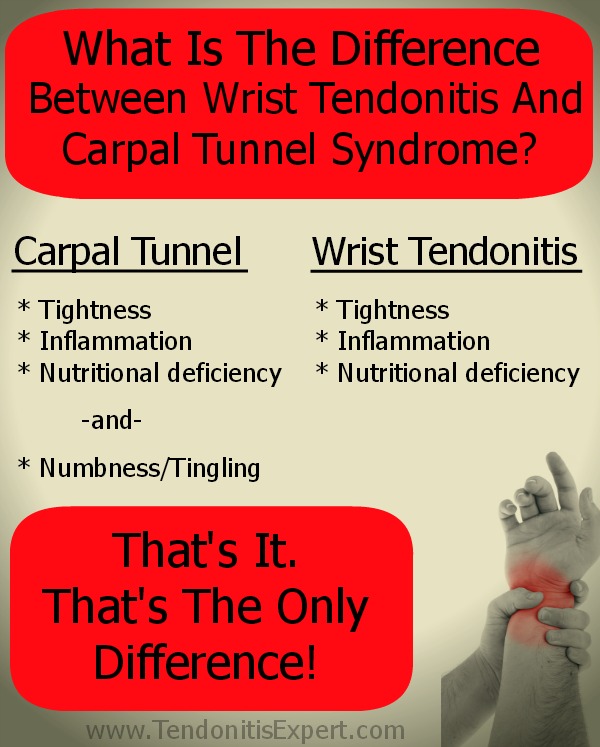How Badly Do You Want To Avoid Wrist Tendonitis Surgery?
Some questions I commonly get include:
"How do I avoid Wrist Tendonitis Surgery?"
And, "I had the surgery, and I'm still in a lot of pain. What do I do now?"
Lucky for everyone, I have answers to those questions.
But first, let me explain about the surgery.
I won't be talking about the 'best' Wrist Tendinitis Surgery, because in my view, there isn't one.
In my opinion, only in RARE, EXTREME cases, is surgery a good option.
Other than that, there is a viable, reliable alternative to surgery. It's amazing what you can do with the RIGHT information.
What Comes Before Wrist
Tendonitis Surgery?
Wrist Tendonitis Surgery is theoretically a last ditch effort to treat Wrist Tendonitis that hasn't responded to the usual, conventional methods of treatment.
A doctor's first prescriptions are usually Rest and over the counter anti-inflammatory drugs like Ibuprofen.
When those measures eventually fail to do the job, doctors then prescribe Wrist Splints and Braces for Wrist Tendonitis. This can include requiring taking time off work, or giving up a beloved hobby, referrals to Physical Therapy, and Ergonomic evaluations.
When Rest, Anti-inflammatories, and Wrist Splints fail to work and the person returns to doctor for more 'help', the doctor's next step is a Cortisone Injection. And several months later, another shot, because the first one either didn't reduce the pain, or it did but the 'benefit' has worn off and pain has returned.
Eventually, the person suffering from Wrist Tendonitis returns, and the doctor recommends Wrist Tendonitis Surgery, because obvious stronger measures are called for since all the other 'treatments' failed to cure the problem.
So, with no better option, and for some reason still trusting the doctor that has so far failed to help reverse their pain and injury, the next step is Wrist Tendonitis Surgery.
In the interests of avoiding 'having' to get surgery for wrist tendonitis, you may want to get on my free 7 lesson Wrist Tendonitis e-course. See below.
And Then There Was Surgery...
There are different variations of ways to go about cutting into a persons wrist and forcibly scraping the tendons.
Admittedly, advances in medical technology make some of the new methods less invasive, and potentially more effective.
Aside from causing damage and injuring an already unhappy body, Surgery doesn't deal with the root cause of Tendonitis.
So ultimately it is doomed to fail.
Imagine that you have severe pain in your wrist due to Tendonitis of the Wrist. You have been valiantly trying for months and months to make it go away.
And then someone takes a sharp object and cuts into your skin, your connective tissue, and then scrapes layers of tough scar tissue and normal tendon tissue from your tendon.
Ouch.
Now the nervous system that was on high alert is on even higher alert.
And yet, the body has amazing healing mechanism.
Many many people get significant benefit from Surgery for Wrist Tendonitis.
Unfortunately, it is a rare occurrence to be 'as good as new' 6-12 months later, and even rarer be be totally pain free years later.
Due to the mechanism of the Tendonitis dynamic, it just doesn't work that way.
It would be nice if surgery was a magic bullet, but it isn't.
The Process From Start To Finish
Over time and due to various factors, you developed a Downward Spiral of Pain and Tightness, and -if- you have true Tendinitis of the Wrist, you have some wear and tear injury to the tendon(s) that cross the wrist joint.
After the usual methods failed to help, you decided to give Wrist Tendonitis Surgery a go.
Under a local anesthetic, the surgeon makes incision(s) into the skin over the scar tissue lesion, and then shaves the excess tendon material away.
In the process, much connective tissue is cut, when can free up the sensation of tightness, and take some of the pressure off the inflammed tissue.
Then you are sent home with some pain killers, told to take it easy for a while, possibly set up for Physical Therapy rehab.
That's it. Pretty simple.
We all hope that it works out and that the problem has been fixed.
What Is The Process Of Recovery From Wrist Tendonitis Surgery?
- Take antiinflammatory meds to dull the inflammation from the surgery.
- Rest to give it time to heal.
- Slowly work your way back to higher levels of activity, stretching and strengthening as you go.
If that worked, people wouldn't be going in for second surgeries.
But they do. Or they just continue to live with the pain.
You Really Don't Have To Live With The Pain.
However, if you have had the surgery or are determined to have it, here are some Tendonitis Expert tips to help you help correctly.
* Once the incisions have sealed, start Ice Dipping your forearms and hands as I describe on the How To Reduce Inflammation page.
* Increase your Protein intake. By A LOT. You need the extra building blocks to heal.
* Keep your wrist moving just a little bit (as little as 1/4 of an inch movement is fine), as constantly as you can. The more it moves, the better it heals. There's a long explanation, but trust me. Keep it moving.
How Do You Avoid Wrist
Tendonitis Surgery?
If you have an actual rip/tear injury, you may actually need surgery.
But if you ONLY have a Tendonitis dynamic, which means that you have Wrist Tendonitis Symptoms from a simple Pain Causing Dynamic, with no actual injury, then my quesiton is, HOW is surgery going to actually help?
- Get on the 7 Lesson e-course (the signup form is higher up the page).
- Learn How To Reduce Inflammation.
- Quiz Your Doctor about the surgery. Make sure you're VERY satisfied with the doctor's responses.
- Get my ebook Reversing Wrist Tendonitis. This ebook contains the complete protocol of how to reliably reverse the Wrist Tendinitis dynamic. It's also great for post-surgery recovery/rehab.
- And actually do what I suggest!
Return to the top of this Wrist Tendonitis Surgery page.
Go to the Wrist Tendonitis page.
Go to the main Tendonitis page.
Go to the TendonitisExpert.com homepage.
| Share Your Story
|




